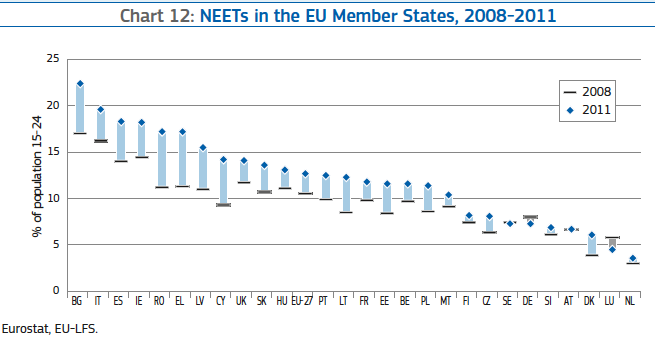NEET stands for ‘Not in Employment, Education or Training’
It is used to measure social exclusion, economic inactivity and levels of disengagement from labour markets.
It was created to measure levels of labour market participation amongst young people in the UK.
In the UK, NEET measures the percentage of young people aged 16-24 who are not in work, education or training. The measure has been adopted by other countries, such as Japan and the EU. It is an important indicator of levels of inactivity amongst young people. Higher levels of NEET are seen as a cause for concern because of higher welfare payments, and the potential breakdown of normal social and economic activity.
Causes of NEET
- High youth unemployment. The main cause of Neet is high youth unemployment. This can be caused by a variety of factors, such as:
- unskilled and no relevant qualifications
- Geographical factors, such as high rates of local unemployment and geographical unemployment
- Poor expectations fostered by lack of role models and high unemployment
- Recession. Levels of Neet has has increased in the 2008-13 EU recession.
- See also: causes of youth unemployment
- Lack of available education and training programmes.
- Education and training programmes that are not suitable.
- Unwillingness or poor information about available training and education programmes
Levels of NEET in UK
Levels of NEETs in Europe

In 2011, in the EU, there were some 7.5 million young people (15-24 years) in a NEET status (12.9 %) (1)
Economic Costs of NEETs
- Higher welfare bill. Europeans aged 15 to 29 who are not in employment, education or training have reached record levels and are costing the EU €3bn a week in state welfare and lost production. (2)
- Higher Crime. NEETs are 20 times more likely to commit a crime. They are 22 times more likely to be a single mum. (3)
- Higher levels of social disengagement. Lack of prospects can create feelings of social exclusion and contribute to riots that have intermittently been seen across Europe.
Eurofound (2012a) estimated the economic costs of the disengagement of young people from the labour market (i.e. NEET costs at around €153 billion or 1.2 % of the aggregated GDP of EU-26 countries in 2011. This is an increase of €34 billion in comparison to 2008 (1)
Related
